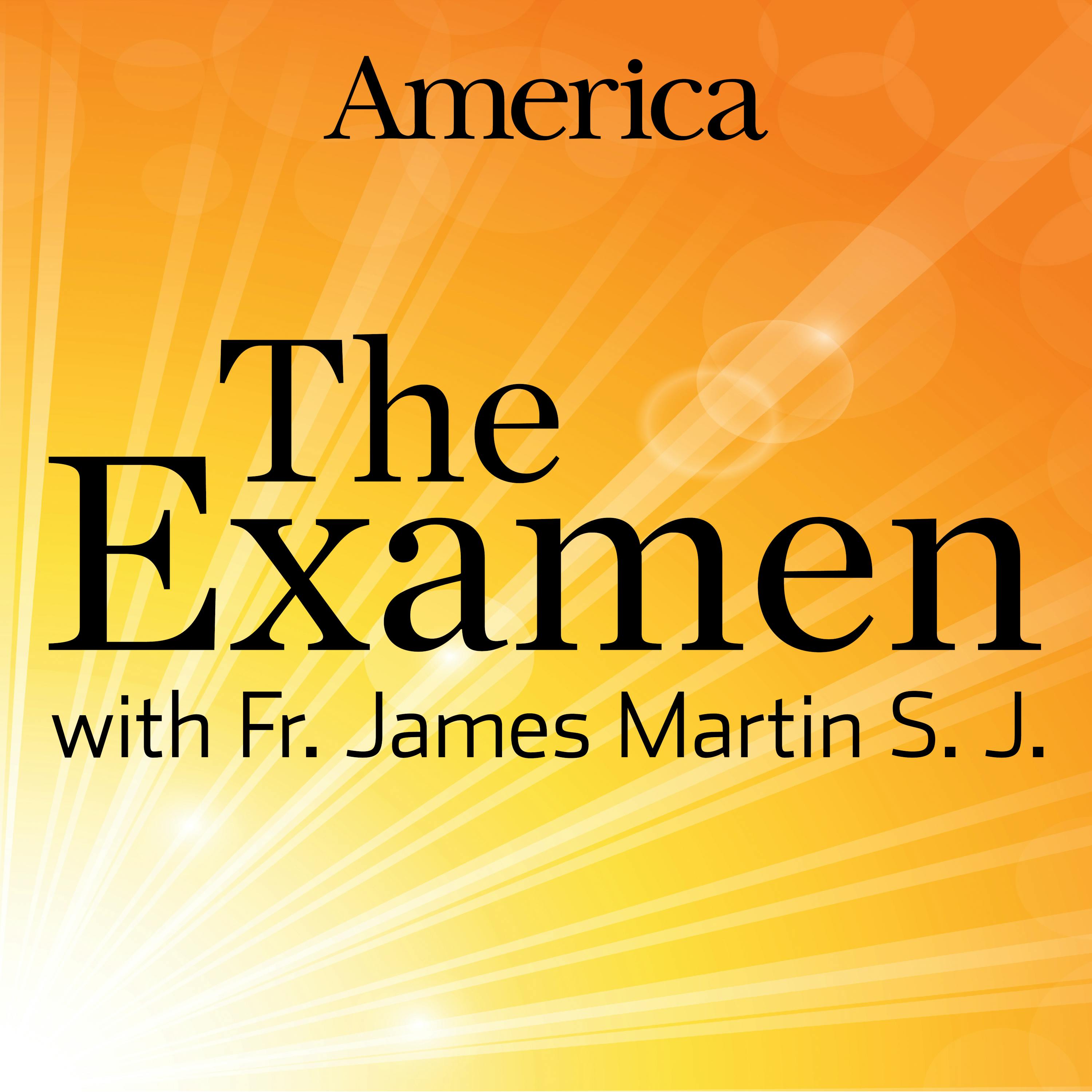
SOLACE: Soul + Grief
This podcast is sponsored by SOULPLUSGRACE serving the San José area, offering grief support and grief journeying with spirituality. I hope to help you travel through grief with God at your side.
"I am a trained Spiritual Director for those who seek to complete the 19th Annotation of St. Igantius’ spiritual exercises OR seek spiritual direction while grieving. I have also worked as a hospital/cemetery chaplain and grief doula. I believe all paths lead to God and that all traditions are due respect and honour. I take my sacred inspiration from all of my patients and companions–past, present and future; the Dalai Lama, James Tissot, St. John of the Cross, the Buddha, Saint Teresa of Ávila, and, of course, Íñigo who became known as St. Ignatius. I utilize art, poetry, music, aromatherapy, yoga, lectio divina, prayer and meditation in my self-work and work with others. I believe in creating a sacred space for listening; even in the most incongruous of surroundings."
BACKGROUND
- Jesuit Retreat Center, Los Altos, CA -- Pierre Favre Program, 3 year training to give the Spiritual Exercises of Saint Ignatius
- Centro de Espiritualidad de Loyola, Spain -- The Spiritual Exercises of St Ignatius of Loyola -- 30 Day Silent Retreat/
- Center for Loss & Life Transition – Comprehensive Bereavement Skills Training (30 hrs) Ft. Collins, CO
- California State University Institute for Palliative Care--Palliative Care Chaplaincy Specialty Cert. (90 hrs)
- Sequoia Hospital, Redwood City, CA -- Clinical Pastoral Education
- 19th Annotation with Fumiaki Tosu, San Jose, CA, Spiritual Exercises of St. Ignatius
- Santa Clara University, Santa Clara, CA M.A. – Pastoral Ministries
CONTACT ME: candeelucas@soulplusgrace.com with questions to be answered in future episodes.
SOLACE: Soul + Grief
A Grief Journey with St. Ignatuis and the Examen
Join us as we walk you through a journey of grief, prayer, and self-reflection, guided by the practice of Examen - a powerful method of prayer crafted by San Ignatius of Loyola. This episode is all about finding ways to be present - truly present - in the midst of grief, from creating a sacred space with candles, music, or religious objects, to the simple, grounding practice of focusing on your own breathing.
Discover the healing essence of expressing respect and love, the transformative potential of forgiveness, and the profound bond between spirituality, love, and grief.
BIBLIOGRAPHY and RESOURCES
Ganns, George E., S.J. (Ed.), Ignatius of Loyola: The Spiritual Exercises and Selected Works, New York; Mahwah, Paulist Press, 1991
Murphy, Marie, New Images of the Last Things: Karl Rahner on Death and Life after Death, New York; Mahwah, Paulist Press, 1988
Rahner, Karl, On the Theology of Death, New York, Herder and Herder, 1971
Thurman, Robert A. F. (Trans), The Tibetan Book of the Dead (as popularly know in the West), New York; Toronto; London; Sydney; Auckland, Bantam Books, 1994
Be sure to subscribe to this podcast on Google Podcasts, Apple, Amazon Music, Spotify, or follow us on the Facebook pages of Gate of Heaven Cemetery in Los Altos, California, or Calvary Cemetery in San Jose, California.
SPIRITUAL DIRECTION WHILE GRIEVING IS AVAILABLE FREE OF CHARGE
You can reach us at: ccoutreach@dsj.org
To arrange personal spiritual direction: 408-359-5542
Our theme music is: Gentle Breeze by Yeti Music from the album "Uppbeat".
Additional Music and sound effects today by: via Pixabay
I. We welcome you to Solace: Soul + Grief. When we started this ministry, we understood how difficult it was to lose a loved one and we had hoped to create a space in a ministry that addressed these concerns and served as a source of comfort and wisdom for those who travel with God on their grief journey. This is brought to you by Catholic Cemeteries, Diocese of San Jose. We're glad you're here. You're always welcome in our circle of healing, love and support.
Candee:The Examen is a method of prayer that was developed by San Ignatius of Loyola, who lived from 1491 through 1556, and was the founder of the Society of Jesus, the Jesuits. He suggested to people to undertake a daily way of praying by examining their lives daily so that they might better serve God. San Ignatius believed that the key to healthy spirituality was to understand you can find God in all things and work constantly to gain enough freedom in your life to understand and conform with God's will. This daily exercise of prayer he called the Examen E-X-A-M-E-N, and he suggested that it be prayed twice daily or, if you prefer once, in the morning or evening, with the practice allowing people to hear God in their hearts and becoming more able to discern God's will for them in their own lives. Making time for prayer allows one the opportunity to fully feel God's presence and enter into a deeper and more intimate relationship with Him. This is what Ignatius called a method for making the general examination of conscience. The medical field in general, and the specialties of palliative care and hospice care in particular, have increasingly recognized the importance of spiritual care for patients and their families through the dying process and beyond and through grieving. Because my ministry is working with the dying and their families, caretakers and those in grief, I wanted to adapt the examen to use by those grieving especially. My goal, then, is to be of assistance for discerning the sacred words, the sacred thoughts and the sacred hearts to assist us as we journey through grief. The five points in the examin are each discussed briefly in this podcast.
Candee:Preliminaries: First learn to be still. The human impulse is to do something. When the most you can do is be there in the now and present moment, your inner voice or your personal meditation or prayer may not be appropriate for anyone but you. It is only necessary to remember that in dying, our loved ones transcend this life. Our human desire after that death is to make our journey as gentle and meaningful as possible. Take this opportunity to feel attentive and open in God's presence. The easiest part is to be present. Remove distractions. Light a candle, create a sacred space with music, a shawl, a blanket, aromatherapy. How can you make the space sacred? Are there art pieces or religious objects that you can bring to the space? What are your other ideas for altering, adjusting or enhancing the physical space In whatever ways seems to be appropriate? Get ready to meet God.
Candee:It helps to be still and to listen in the quiet betweens and learn to discern what you might want or need by simply breathing, noticing your breath and being in the present moment. Of course, we are limited by our very human selves, with what we have to offer, and so I offer this centering prayer. You should recall that you are in the presence of God. Beings are always in the presence of God, but in prayer we place ourselves in God's presence, ask God to help you look at this life moment with love and gratitude for this day and all you have been given. I use a prayer like this my dearest God, in the sweet garden of my heart, I remember you, your face in all the trees and flowers and abundance of life greening. I could feel your presence, then, in the very vibration of the air in the trees. Can you please help me feel it again right now? Amen. Start with breathing. What do you notice about your own focus? What do you notice about your own ability to focus? What can you notice when you breathe by slowing down and noticing your own breath? Please note here what other poems, prayers, scriptures or thoughts help you to attend to the present moment. Make a group or list of these for you to resource. Then sit down, breathe deeply and put yourself in God's presence.
Candee:The first point in the examen is gratitude. Remember this time with gratitude. Look at this day, this time, and remember your loved one with gratitude. You can begin to give thanks to God for the gift of time with your loved ones. Take special care to notice what is being received and what can be given or offered. Take a complete review of your gifts and the particular gifts of this day. Take pause to thank God for all gifts, but most especially of the gift of being allowed to honor the person in your life that you have lost. This time, in remembrance, you are nurturing yourself on this journey. Know God and others may accompany you part of the way, no matter what your person did or was or did in their life before, to recognize now the importance of their part in your life, their space in your life and the respect and love we gave to them and they gave to us. This all leads to a feeling of gratitude for the gift of being part of that special life. Surround yourself and that person with gratitude.
Candee:For the moment, I offer the following prayer of meditation on thanks, or you can use your own. God,You have filled this life with much abundance, for which I am most grateful. I will not let hearts fill with doubt at this moment of grieving. I will keep love in my heart. I will keep hope in my spirit. I will keep the ultimate question in my mind as my loved one turned to meet your embrace, as they abandoned their earthly self into your own self expression, I know your mind was there to know their mind. Your heart was there to unfold their heart. Your ultimate self was there for greeting, to take my special person into your selfness, where their hearts desire meets your heart's desire and those two become one Amen.
Candee:The second movement in the examen is to focus on the grace, to acknowledge the grief shadows. Here you should pay attention to your own emotions. You should ask for assistance from God. Become aware of the ways you have responded to God's gracious gifts and love. This day, ask God to come into your heart and help you look at your actions clearly, with an understanding of what might be your limitations. Do not judge what comes to you. This is a gentle look with God on how you responded to God's gifts today and in this moment. Review this event, notice the details, the context of what happened or what is happening, how you acted, your motives, your feelings. Was there a failure to act or to respond? Where today did you not feel your best? Was there a barrier between you and God? How conscious have you been of God and his movement in your life today? When did you exhibit genuine love and charity? When did you hold back?
Candee:This point in the examen is all about limitations, points of obscurity or shadow between you and God, and yourself and others. Each of us must confront the fact that our own death and the death of others is very real, but it should also be remembered that what life is really about is the construction of a reality that is open to our God, whom we call various names, including Abba, father, god, jesus, the infinite. If we do not allow our thinking of our own death and the death of others, it has no meaning. Other traditions note the same stumbling block. What is called for here is not dwelling on the darkness or the obscurity of death, but an acknowledgement of it. The idea that here darkness, shadow or obscurity is acknowledged is both refreshing and restorative. However, I find it more meaningful to take a more conciliatory tone, as in this prayer: Dearest God, I have loved you all my life. Your love is the source and foundation of my very own. I have held my arms around those I love as you have held your arms around me. The limitations of my human love have felt like bitter fruit in my mouth. Yet I have never felt the limitations of your love, because I have known the love at first sight of a newborn child and hold this most perfect love to be the most like yours for me. I expect soon the dear one to be unfolded and envelloped and engulfed in your love, amen.
Candee:The third step in the examen is to ask an account of a grief encounter as to thoughts, then words, then deeds. Choose one feature of your grief experience today and pray from it. You should notice the initial response to coming upon this moment. Are specific people or conditions causing you to have a negative response? Try to see both the positive and the negative. Where has God helped you have a positive response to life and to grief? Maybe you could have accepted more help from that presence or that experience. Let yourself become more sensitive to God's grace. Notice other forms of God's presence. You will begin to notice the signs of God's grace that have already come through in people, in word or indeed. These graces, the intuitions of the things God wishes to be done, will come inside and outside of other regular prayer. Notice them. Write them down in a journal. Where in the encounter of a grief moment did you find the most internal resistance? Where in the encounter of a grief moment did you notice consolation or desolation? Write these in your journal. Fourth, ask pardon of God for your shortcomings.
Candee:The Jesuit theologian Karl Rahner noted that to the innermost reality of the world there belongs what we call Jesus Christ in his life and death. What was poured out over the cosmos at the moment when the vessel of his body was shattered in death and Christ actually became, even in his humanity, what he had always been by his identity —the heart of the universe, the innermost center of all created reality. The longing for a God-self experienced by each human can only be expressed through radical freedom and complete surrender, which is only made possible in temporal human death. Matthew tells us as Jesus was dying on the cross, he spoke these words “Eli Eli Lama Sabattani”, that is to say my God. My God, why hast thou forsaken me? Jesus was expressing his most human self at the hour of his temporal death. He is recognizing that this human death is a journey taken both existentially and actually alone.
Candee:Luke gives us a slightly different version, and the two quotations taken together give a fuller picture. In Luke, Jesus' last words are --Father, into your hands, I commend my spirit. This version is indicative of the idea that Jesus recognizes that his humanness is falling from him like a cloak, and the oneness of God's world and all mankind await him. By his human death, Jesus transformed dying, which previously had been a manifestation of sin, into a manifestation of grace, as surely as human beings long for completion. The stories in Matthew and Luke presents the act of dying as one of pure, radical freedom and final and finite choice for a God-self, as opposed to a choice against a God-self. It is a story of Jesus moving through his own humanness and transcending into the mind-heart an idea of God himself as a fountainhead asking for and receiving complete, perfect pardon. St Ignatius teaches us the way to recognize the movement of God in our lives. The movement is necessary to go beyond the recognition of one's transgressions into pardon and forgiveness. I believe this is a meaningful illustration for those of Christian faith, and St Paul's letter to the Thessalonians serves to direct our attention to our own shortcomings, along with the inherent pardon for the frailness of our own humanity.
Candee:The fifth: resolve with grace to do better, look forward to tomorrow, reconcile and resolve. Repetition allows more openness to God. A heart-to-heart talk with Jesus or God is the fruit of this repetition. Imagine Jesus, the Dalai Lama, or a great, trusted friend sitting beside you. Maybe there's something you missed or did wrong or just forgot. Now is the time to tell this story, to tell this friend you are sorry and ask the friend to be with you the next time a similar situation arises. Remember all the good things and thank the friend or God for being with you and you avoided a wrong choice or resisted an old temptation. Feel the sorrow in your heart when you apologize, but also the gratitude when you give thanks for God's gentle work inside your heart. What are the needs for tomorrow?
Candee:None of us who have not experienced death can really know, explain or anticipate our responses to it, nor the responses or reactions of others. This hope, this small contribution to thinking about grief and love and hope and knowledge that we can provide some structure or foundation for delivering or facilitating solace. Grieving as an act is an extreme case of something undergone. We die throughout life because we constantly reach beyond what can be stated toward the incomprehensible. By living their life, people are interpreting their own death. Dearest God, I have surrendered my living to you all of my days, and someday I will be surrendering my dying to you In my days that are left. Can you help me know the faithfulness of that ultimate surrender when that time comes? Will you help me to feel, even now, your ultimate embrace? Amen. When death occurs, God’s presence is always there, heightened. A temporal life and a spiritual life are always shading and coloring this transition, living in and out of one another. We do not live in a vacuum and we and our loved ones do not die in a vacuum.
Candee:As survivors, it's important to fill that grief time with meaning, love, support and respect. Traditional words and prayers do not always seem as personal, nor as pastoral as your own may be. So feel free to use your own, or feel free to use mine. As I wrote this prayer for the departed— I awoke to discover I was a jewel in the mind of God, held fast in the womb of His love, blinded by the light from His eyes, feeling the music of His beating heart. Perfect in His grace, our hearts were perfectly connected and beat as one. I swooned in His embrace and my tears flowed down my face like a burst fountain. He comforted me gently, soothed my brow, stilled my dread. I balanced there in the space between His heart and mind, waited there quietly in perfect sanctuary.
Candee:I awoke to discover I was a jewel in the mind of God. Moon-Jesus, open and white and smooth, cool and welcoming, on the far shore, lying in the water pools, waves lapping to and fro, hair fronds all around reaching out and back, through sea flowers and sea stars, making sense of the night, blackness, aware and awake through all of the going and all of the coming. You wait for me, beckoning. Will my surrender be my death? —What more is a life force than passion plus faith? And when the spark of living is gone, the passion and faith are left as part of a living God, of whatever tradition In human transcendence. We continue to love and we don't stop. We continue to ask questions and we don't stop. We continue to hope and we don't stop. If, in every human act of knowing, a person knows himself and, consciously or not, experiences a God self, then a God self has most certainly experienced that human death with and within each individual person. The reaching toward the God self or the infinite horizon is man's primary vocation in life, and the transition through temporal death does not change the nature of that vocation. Rather, that vocation is but heightened, and those who accompany and survive are privileged to witness.
Candee:A complete bibliography for this episode is included in the show notes. That concludes another episode. Please support us by subscribing on Spotify, Amazon Music, Apple Podcasts or Google Podcasts. We always welcome your comments and feedback. Remember, spiritual direction is always available through Catholic cemeteries. I'm Candee Lucas, chaplain, aftercare coordinator and spiritual director at Catholic Cemeteries. You can reach us through the email or telephone number on the show notes. Be gentle with yourselves. Travel safely with God. Thank you.








